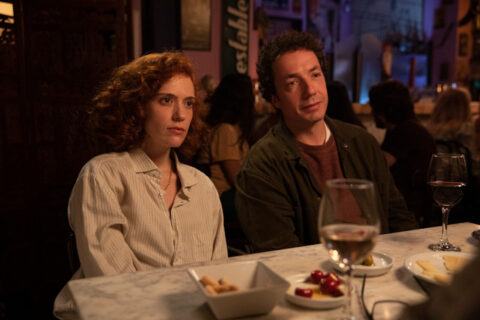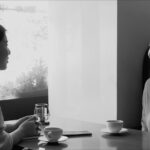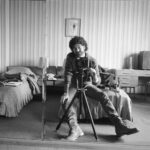Ale (Itsaso Arana) and Alex (Vito Sanz) are separating. But they’re good. The feeling was mutual. They want to have a party. The 22nd September. The last day of summer. As Ale’s dad always said, you should celebrate separations, not unions. They’re listening to his advice. They’re having a party. You should come. It’s like the opposite of marriage. It’s The Other Way Around (Jonás Trueba, 2024).
There is beauty and meaning in repetition.
There’s also frustration. Indignation. Impatience. Trueba endlessly dissects the comedy of remarriage — The Philadelphia Story (George Cukor, 1940), His Girl Friday (Howard Hawks, 1940), etc, — here, finding pleasure and smarts in circular dialogue and quizzical narrative; analysing the ticks and traits of his characters in minuscule detail as they get ready for their grand Paltrow-Martin cosplay.
Throughout, the Spaniard mines beauty — and meaning — in repetition. Some people will find it exhausting. Enervating! I found it highly puzzling. But in a good way. Like the repetitive pleasures of a puzzle.
Repetition, its variations, its meaning — its beauty — lies at the core of the film. Hong and Rohmer feel like Lean and Leone in comparison. It is not hidden from view. It is everything. It is a philosophy (Kierkegaard’s eponymous 1843 book is mentioned) and a stylistic device. It gives you a way of reading the film. It also gives you a way to enjoy it, avoiding the clichés of the romantic comedy (“his flaws are actually what made her love him in the first place”¹) in favour of a minutely-detailed discourse on the peculiarities of relationships themselves.
Ale and Alex’s separation (they’re good; the feeling was mutual) is announced at least 15 times. They tell Ale’s dad (he said he mentioned it once). They tell Alex’s agent. They even tell the plumber, whose level of disinterest is hilariously palpable. Everyone gets invited to the party. 22nd September. The last day of summer. It’ll be beautiful. Meaningful.
Ale is making a movie. Her film — starring Alex — is — of course — remarkably similar to what Ale and Alex — consciously uncoupling; but they’re good — are going through. Her team debates whether it’s a circular film — in which ideas are presented or discussed — or a linear film, leading up to a conventional ending. It’s hard for us to gauge. But she certainly finds beauty and meaning in repetition.
It would all be endlessly annoying if Arana and Sanz didn’t find meaning — and beauty — in their repetitions. The body language — uncertain; nervous — tells a different story. Because there is no fixed meaning in breakups. There is no official version of events. There is, instead, a constant restlessness; a mishmash of perspectives. So we have to keep telling the same story to try and get our stories straight. We never succeed of course. But we find beauty, and meaning, in repetition.
It’s shot in a mostly realist style — with modest interiors, simple camera movements and affectless performances — allowing for small stylistic punctuations — jump cuts, speedy montage, voiceover — to create lively riffs and ruptures that comment upon and subvert the simplicity of the narrative.
The supreme confidence is knowing how to make something that could be so exhausting and find a way to engage us throughout. In the end, The Other Way Around manages to have it all. Meaning. Beauty. Repetition.
-
This quote is not in the movie. I just made it up.
Redmond is the editor-in-chief of Journey Into Cinema.





